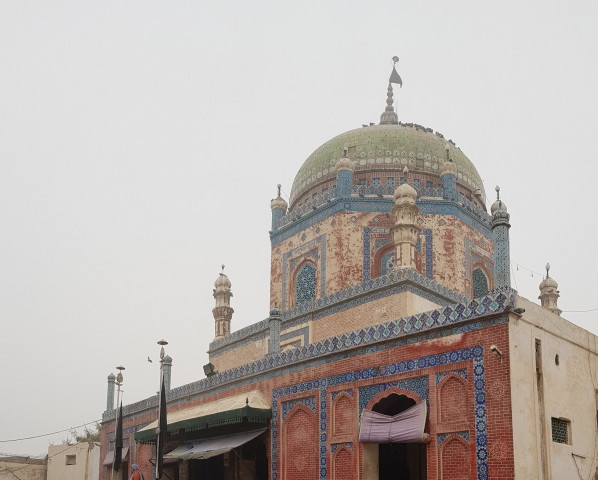Shifting sands of power in Multan
Influential figures, who once held key positions, now emerging as symbols of resistance

In an unprecedented twist, the electables of South Punjab, who have traditionally danced to the tunes of the mighty establishment’s drumbeats, are now seen donning the mantle of dissidents.
The kingmakers of Multan – historically a bastion of influential landlords and revered "gaddi-nasheens" (saintly lineage) – have traded their power suits for revolutionary attire in the face of emerging tides.
For generations, the political virtuosos of South Punjab have played a leading role, choreographing governments, both at the centre and province, with harmonies that often aligned with the country's powerful establishment.
The urban vote bank, once tethered to traditional patronage structures, is now in the throes of a significant shift as the politicians awaken to the realisation that their political fate is intricately tied to the heartbeat of public sentiment.
In a surprising departure from the expected script, political arch-rivals like Makhdoom Javed Hashmi and Shah Mehmood Qureshi are crafting a new image for the region.
Hashmi, known for his unwavering commitment to civilian supremacy, remains a credible pro-democracy voice in the nation.
Former prime minister Syed Yousaf Raza Gillani, another prominent “gaddi-nasheen” from the region, lost his coveted position for defying the whims of the powers that be, opting to safeguard his party's interests.
Gillani, who served as the speaker of the National Assembly during Benazir Bhutto's 1993-1996 term, faced imprisonment on corruption charges, which his party believed were fabricated to coerce him into changing loyalties.
The Pakistan Peoples’ Party (PPP) rewarded him by electing him as prime minister when the party formed the government next time in 2008.
In June 2012, the Supreme Court under former chief justice of Pakistan Iftikhar Muhammad Chaudhry disqualified him from the country's prime minister office. He was convicted of contempt for refusing to request Swiss authorities to reopen corruption cases against President Asif Ali Zardari.
The embattled PPP at that time was facing a tough time from the top court under CJ Chaudhry.
His government was at odds with powers that be on many issues and he was punished for his defiance.
A recent addition to this changing political landscape is Shah Mehmood Qureshi, the vice chairman of Pakistan Tehreek-e-Insaf (PTI). Despite his pro-establishment credentials, Qureshi stands firmly with his party supremo against all odds.
Read: PPP, PTI independents to form govt in centre: Khuhro
Much like former Punjab chief minister Chaudhry Pervez Elahi, Qureshi has defied critics who doubted his willingness to go against the will and blessings of the establishment.
Makhdoom Javed Hashmi, a key leader of then-marginalised PML-N, endured a prison sentence under the military rule of General Pervez Musharraf in 2004 on charges of treason.
His sentence was overturned by the Supreme Court in August 2007. After parting ways with PML-N, Hashmi joined Imran Khan's PTI in 2011, serving as the party's president. He left PTI in disagreement with Khan's attempt to overthrow the elected PML-N government through demonstrations in 2014, alleging support from some quarters in the military.
At a time when PTI candidates are not allowed to do their election campaign, Hashmi recently offered his home for PTI-backed candidates to hold their public meetings. This resulted in a police raid at the residence of a veteran politician.
Qureshi, the custodian of the shrine of Bahauddin Zakariya, served as the foreign minister from 2008 to 2011 in the PPP government. He parted ways with Zardari's party due to differences over the repatriation of Raymond Davis, a US security contractor who killed two Pakistanis in Lahore.
Joining PTI during a time when politicians from various parties were bolstering Khan's ranks under the tacit patronage of powerful quarters in Islamabad, Qureshi served as the foreign minister in PTI's government from 2018 to 2022.
Currently behind bars in the cyber case along with PTI's founder, Qureshi is reportedly under pressure to testify against Khan. Critics say Qureshi has been ambitious and desires to take over the party in Khan's absence, but the former is too adamant to hand over the reins of power to anyone else.
However, his resistance to pressure from powerful quarters is uncommon for someone with Qureshi's purported image, especially when many of Khan's loyalists left without much resistance.
Similar to numerous individuals who departed from PTI to align with other parties or congregated under Jahangir Tareen’s IPP in pursuit of more promising opportunities in the upcoming government, there were several potential avenues to accommodate Qureshi if he had chosen to yield.
As political alignments continue to shift, and individuals explore different paths within the political spectrum, the question remains: In a political landscape rife with uncertainties, will Multan's changing power dynamics pave the way for its nationally known faces to continue their defiant posture to change the traditional image that South Punjab goes for Pindi.
Only time will unveil the answers in this evolving chapter of Multan's political narrative.



1724319076-0/Untitled-design-(5)1724319076-0-208x130.webp)















COMMENTS
Comments are moderated and generally will be posted if they are on-topic and not abusive.
For more information, please see our Comments FAQ